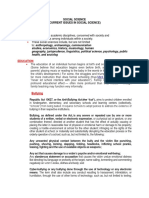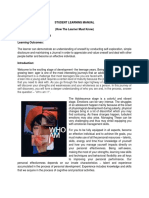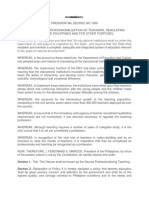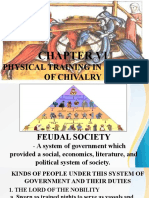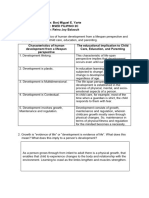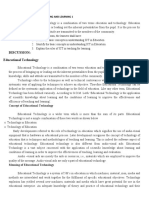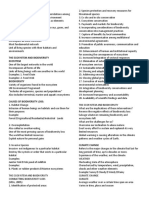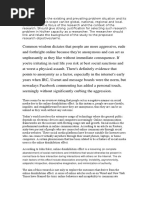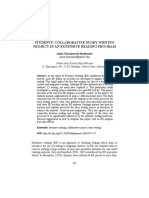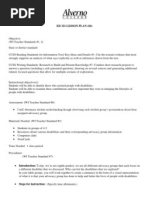Developmental Theories and Other Relevant Theories: Vygotsky'S Socio-Cultural Theory Kohlberg'S Stages of Moral Development
Developmental Theories and Other Relevant Theories: Vygotsky'S Socio-Cultural Theory Kohlberg'S Stages of Moral Development
Uploaded by
Darlene Dacanay DavidCopyright:
Available Formats
Developmental Theories and Other Relevant Theories: Vygotsky'S Socio-Cultural Theory Kohlberg'S Stages of Moral Development
Developmental Theories and Other Relevant Theories: Vygotsky'S Socio-Cultural Theory Kohlberg'S Stages of Moral Development
Uploaded by
Darlene Dacanay DavidOriginal Title
Copyright
Available Formats
Share this document
Did you find this document useful?
Is this content inappropriate?
Copyright:
Available Formats
Developmental Theories and Other Relevant Theories: Vygotsky'S Socio-Cultural Theory Kohlberg'S Stages of Moral Development
Developmental Theories and Other Relevant Theories: Vygotsky'S Socio-Cultural Theory Kohlberg'S Stages of Moral Development
Uploaded by
Darlene Dacanay DavidCopyright:
Available Formats
FM-AA-CIA-15 Rev.
0 10-July-2020
Study Guide in Prof. Ed. 102 Child and Adolescent Learners and Learning Principles Module No. 8
STUDY GUIDE FOR MODULE NO. 8
Developmental Theories and other Relevant Theories:
VYGOTSKY’S SOCIO-CULTURAL THEORY
KOHLBERG’S STAGES OF MORAL DEVELOPMENT
MODULE OVERVIEW
The key theme of Vygotsky’s theory is that social interaction plays a very important role in cognitive
development. He believed that individual development could not be understood without looking into
the social and cultural context within which development happens. Scaffolding is Vygotsky’s term for
the appropriate assistance given by the teacher to assist the learner accomplish a task.
In this module, Kohlberg’s theory of moral development will be discussed. He was interested in
studying the development of moral reasoning. He based his theory on the findings of Piaget in
studying cognitive development. Our ability to choose right from wrong is tied with our ability to
understand and reason logically.
MODULE LEARNING OBJECTIVES
In this module, challenge yourself to:
Explain why Vygotsky’s theory is called “Socio-cultural theory.”
Differentiate Piaget and Vygotsky’s views on cognitive development.
Explain how scaffolding is useful in teaching skill.
Explain the stages of moral development of Kohlberg.
Analyze a person’s level of moral reasoning based on his responses to moral dilemmas.
Cite how the theory of moral development can be applied to your work as a teacher later on.
LEARNING CONTENTS : VYGOTSKY’S SOCIO-CULTURAL THEORY
When Vygotsky was a young boy he was educated under a teacher who used the Socratic method.
This method was a systematic question and answer approach that allowed Vygotsky to examine
current thinking and practice higher levels of understanding. This experience, together with his
interest in literature and his work as a teacher, led him to recognize social interaction and language
as two central factors in cognitive development. His theory became known as the Socio-Cultural
Theory of Development.
Piaget and Vygotsky
Vygotsky worked on his theory around the same time as Piaget in between the 1920's and 30's but
they had clear differences in their views about cognitive development. Since Piaget was taken up
already in the preceding module, it would be easier now to see how his views compare with
Vygotsky's.
PANGASINAN STATE UNIVERSITY 1
FM-AA-CIA-15 Rev. 0 10-July-2020
Study Guide in Prof. Ed. 102 Child and Adolescent Learners and Learning Principles Module No. 8
Piaget Vygotsky
More individual in focus More social in focus
Believed that there are universal stages of
Did not propose stages but emphasized
cognitive development on cultural factors in cognitive
development
Did not give much emphasis on language Stressed the role of language in cognitive
development
SOCIO-CULTURAL THEORY OF DEVELOPMENT
1. Social Interaction
Vygotsky states the importance of cultural and social context for learning. Cognitive
development stems from social interactions from guided learning within the zone of proximal
development as children and their partner's co-construct knowledge. In contrast, Piaget
maintains that cognitive development stems largely from independent explorations in which
children construct knowledge of their own.
For Vygotsky, the environment in which children grow up will influence how they think and
what they think about.
2. Cultural Factors
Vygotsky suggested that cultures are actually formed through the use of tools and symbols,
and that this key distinction is what differentiates the human race from that of animals.
Intelligence is achieved when a learner can “internalize” the tools that are being provided in
the culture itself. When the tools of a culture evolve and emerge, the learners’ ability to grow
as individuals and increase their knowledge base is broadened. As such, according to the
Sociocultural Learning Theory, it's important for instructors to understand the human mind
from a historical point of view as well as a cultural one.
3. Language
According to the Sociocultural Learning Theory, language is a direct result of the symbols
and tools that emerge within a culture. An individual is able to learn language through a
variety of social events, scenarios and processes, which all result in the acquisition of
language. This aspect of the Sociocultural Learning Theory relies upon the idea that learners
go through three stages of speech development. First, they must engage in the social
environment, which is known as “social speech” and begins at the age of 2. Next, they will
learn about “private speech”, which occurs when learners voice their thoughts aloud, and
begins at the age of 3. The last is “inner speech”, which takes the form of ideas that remain
within our minds and directly impact our behavior or thoughts, and begins at the age of 7.
4. Zone of Proximal Development
This is the “gap” or distance that exists between a learner's possible educational
development, which is determined through problem solving activities, and the development
that actually takes place. This is assessed when learners are asked to engage in problem
solving tasks under the supervision of an instructor. Their responses and capabilities are
then compared to that of their peers. This assessment is based upon a spectrum, wherein
what learners are capable of doing without any assistance is at one end of the spectrum,
and what they can do while being assisted is at the other. In essence, the zone allows
instructors to learn what a student is not yet capable of doing or has not yet learned, but can
be taught with the proper instruction.
Read more on:
PANGASINAN STATE UNIVERSITY 2
FM-AA-CIA-15 Rev. 0 10-July-2020
Study Guide in Prof. Ed. 102 Child and Adolescent Learners and Learning Principles Module No. 8
http://www.ceebl.manchester.ac.uk/events/archive/aligningcollaborativelearning/Vygotsky.pdf
https://educationaltechnology.net/lev-vygotsky-sociocultural-theory-of-cognitive-development/
LEARNING ACTIVITY 1
Write a reflection on Vygotsky’s Socio-Cultural Theory. Write down your thoughts and
feelings in no less than 150 words.
LEARNING CONTENTS : KOHLBERG’S STAGES OF MORAL DEVELOPMENT
Lawrence Kohlberg built on Piaget's work, and set the groundwork for the present debate within
psychology on moral development. Like Piaget, he believed that children form ways of thinking
through their experiences which include understandings of moral concepts such as justice, rights,
equality and human welfare. Kohlberg followed the development of moral judgment and extended
the ages covered by Piaget, and found out that the process of attaining moral maturity took longer
and occurred slower than Piaget had thought
If Piaget designed specific tasks (Piagetian tasks) to learn about the cognitive development of
children, Kohlberg utilized moral dilemmas (Kohlberg dilemmas). The case you read in the Activity
part of this module was written for this module but was based on how Kohlberg wrote his dilemmas.
Like Piaget, he presented these dilemmas to the individuals in his research and asked for their
responses. He did not aim to judge whether the responses were right or wrong. He was interested
in analyzing the moral reasoning behind the responses.
From his research, Kohlberg identified six stages of moral reasoning grouped into three major
levels. Each level represents a significant change in the social-moral reasoning or perspective of the
person.
PANGASINAN STATE UNIVERSITY 3
FM-AA-CIA-15 Rev. 0 10-July-2020
Study Guide in Prof. Ed. 102 Child and Adolescent Learners and Learning Principles Module No. 8
Read more on:
https://www.simplypsychology.org/kohlberg.html
LEARNING ACTIVITY 2
Identify the stage of moral development shown in the following:
______1. Joy allows her classmates to copy her homework so that they will think she is kind and
will like her to be their friend.
______2. Ricky does everything to get passing grades because his Mom will take his play station
away if he gets bad grades.
______3. A civic action group protests the use of pills for family planning, saying that although the
government allows this, it is actually murder because the pills are abortifacient (causes
abortion)
______4. Jinky lets Hannah copy during their math test because Hannah agreed to let her copy
during their sibika test.
______5. Karen decides to return the wallet she found in the canteen so that people will praise her
honesty and think she's such a nice girl.
______6. John decides to return the wallet he found in the canteen because he believes it's the
right thing to do
______7. Lyka wears her ID inside the campus because she likes to follow the school rules and
regulations.
______8. A jeepney driver looks if there's a policeman around before he u-turns in a no u-turn spot.
______9. Liza volunteers to tutor children-at-risk children in her community for free so they will learn
to love school and stay in school.
______10. Little Riel behaves so well to get a star stamp from her teacher.
SUMMARY
PANGASINAN STATE UNIVERSITY 4
FM-AA-CIA-15 Rev. 0 10-July-2020
Study Guide in Prof. Ed. 102 Child and Adolescent Learners and Learning Principles Module No. 8
Vygotsky always emphasized the role of cultural factors in cognitive development. He also identified
intellectual tools of adaptation which enable individuals to acquire cognitive skills depending on
what tools their culture has made available for them.
Lawrence Kohlberg (1958) agreed with Piaget's (1932) theory of moral development in principle but
wanted to develop his ideas further.
He used Piaget’s storytelling technique to tell people stories involving moral dilemmas. In each
case, he presented a choice to be considered, for example, between the rights of some authority
and the needs of some deserving individual who is being unfairly treated.
Kohlberg identified three distinct levels of moral reasoning: pre-conventional, conventional, and
post-conventional. Each level has two sub-stages.
People can only pass through these levels in the order listed. Each new stage replaces the
reasoning typical of the earlier stage. Not everyone achieves all the stages.
REFERENCES
Brenda B. Corpuz, Ph.D, et. al. (2018). The Child and Adolescent Learners and Learning Principles.
Quezon City, Metro Manila, Phil. Lorimar Publishing Inc.
https://elearningindustry.com/sociocultural-learning-theory
https://www.simplypsychology.org/vygotsky.html
https://www.simplypsychology.org/kohlberg.html
https://www.google.com/search?q=kohlberg
%27s+stages+of+moral+development&rlz=1C1CHBD_enPH919PH919&sxsrf=ALeKk00DG8Y-
VMUUhUu5zyGP4Jwz2zG6pA:1602781102012&tbm=isch&source=iu&ictx=1&fir=M1dGmhYPDCJu
4M%252CTTT-uJDCbRhPVM%252C_&vet=1&usg=AI4_-
kQPcDFBrGr0l6G_ApBN_t0x1g2j_w&sa=X&ved=2ahUKEwiGr_PxiLfsAhXlxIsBHYduCdAQ9QF6BA
gCEFI&biw=1366&bih=599#imgrc=M1dGmhYPDCJu4M
PANGASINAN STATE UNIVERSITY 5
You might also like
- Unit 3.1prof Ed. 101Document32 pagesUnit 3.1prof Ed. 101Domenique Escober RamosNo ratings yet
- FIDP in 21st Century LiteratureDocument13 pagesFIDP in 21st Century LiteratureKatherine Pagas Galupo100% (2)
- Social ScienceDocument9 pagesSocial SciencenathanielNo ratings yet
- Psychology in The Real WorldDocument3 pagesPsychology in The Real WorldEmily EvensonNo ratings yet
- SMART Goal WorksheetDocument4 pagesSMART Goal WorksheetJaskiran KaurNo ratings yet
- Entrepreneurship Module 1Document7 pagesEntrepreneurship Module 1Chad Laurence Vinson CandelonNo ratings yet
- Part 6. Sample Learners Learning MaterialDocument17 pagesPart 6. Sample Learners Learning MaterialJonJon BrionesNo ratings yet
- GMRC Docu W TempDocument29 pagesGMRC Docu W TempZach JanayonNo ratings yet
- Module Ii: Addressing Diversity Through The Years: Special and Inclusive EducationDocument19 pagesModule Ii: Addressing Diversity Through The Years: Special and Inclusive EducationChyn Maicah Noble PanesNo ratings yet
- Concept of SocietyDocument10 pagesConcept of SocietySamina HaiderNo ratings yet
- Why I Want To Teach: Exploring Factors Affecting Students' Career Choice To Become TeachersDocument28 pagesWhy I Want To Teach: Exploring Factors Affecting Students' Career Choice To Become TeachersAmadeus Fernando M. PagenteNo ratings yet
- Readings 5 (Activities)Document3 pagesReadings 5 (Activities)Alexander RamirezNo ratings yet
- PD 1006Document5 pagesPD 1006Jan Peter PiliNo ratings yet
- Assignment No. 1: GENERAL INSTRUCTION: Use Microsoft Word, Legal, 12 Arial. COPY THE FORMATDocument2 pagesAssignment No. 1: GENERAL INSTRUCTION: Use Microsoft Word, Legal, 12 Arial. COPY THE FORMATLian AndrealsNo ratings yet
- The Teacher The Community School Culture and Organizational LeadershipDocument14 pagesThe Teacher The Community School Culture and Organizational LeadershipGlen Rose CadeliñaNo ratings yet
- Chapter 5 AnswerDocument7 pagesChapter 5 AnswerDIMPZ MAGBANUANo ratings yet
- Educ 101 ReviewerDocument3 pagesEduc 101 ReviewerVince Andrei MayoNo ratings yet
- Chapter Ii. Pillars of EducationDocument12 pagesChapter Ii. Pillars of EducationAthneil ToledoNo ratings yet
- Exercise 2: Expression, English Sentence or Mathematical Sentence. For Each Sentence, Circle The Verb andDocument1 pageExercise 2: Expression, English Sentence or Mathematical Sentence. For Each Sentence, Circle The Verb andInvincibleReineNo ratings yet
- Article-3-Collaborative Strategic Reading-On The Road To Successful English Language ReadersDocument4 pagesArticle-3-Collaborative Strategic Reading-On The Road To Successful English Language ReadersJumhela Joy DinglasNo ratings yet
- Physical Education of ChivalryDocument23 pagesPhysical Education of ChivalryRen Del Monte100% (1)
- Chapter 2B Developmental Stages According To SantrockDocument44 pagesChapter 2B Developmental Stages According To SantrockJheny Palamara100% (1)
- Activity 1Document5 pagesActivity 1Borj YarteNo ratings yet
- "Teaching As Your Vocation, Mission and Profession": Lesson 5Document23 pages"Teaching As Your Vocation, Mission and Profession": Lesson 5ciedelle arandaNo ratings yet
- The Article XIV of The 1987 Philippine ConstitutionDocument12 pagesThe Article XIV of The 1987 Philippine ConstitutionMei MeiNo ratings yet
- Lesson 7 The Teacher and The Community - Teacher's Ethical and Professional BehaviorDocument4 pagesLesson 7 The Teacher and The Community - Teacher's Ethical and Professional BehaviorAremzyNo ratings yet
- The Problem and Its Context 1.1Document10 pagesThe Problem and Its Context 1.1Bright MachawiraNo ratings yet
- Module 1-Lesson 1Document8 pagesModule 1-Lesson 1Kel LumawanNo ratings yet
- Reflection Papers 7Document12 pagesReflection Papers 7Shiela Marie NazaretNo ratings yet
- Chapter 1Document37 pagesChapter 1Gerleen Santiago Lazona100% (2)
- Prof Ed ReviewerDocument54 pagesProf Ed ReviewerAniah OdinNo ratings yet
- Educ 101.module 12Document10 pagesEduc 101.module 12Avigale VelascoNo ratings yet
- TeachingProfession Unit 5 QuizDocument11 pagesTeachingProfession Unit 5 QuizZhelou Mae DulapNo ratings yet
- My Reflection To The Movie "The Miracle Worker"Document4 pagesMy Reflection To The Movie "The Miracle Worker"Egielyn SisterNo ratings yet
- Chapter 1 Lesson 5Document5 pagesChapter 1 Lesson 5Roselle Ann LizardoNo ratings yet
- Educ 301 Module 1Document17 pagesEduc 301 Module 1Jear SanchezNo ratings yet
- The Lesson Plan Kinds Formt Components of The Lesson PlanDocument4 pagesThe Lesson Plan Kinds Formt Components of The Lesson PlanWinnie Joy ApolonioNo ratings yet
- BISU Preliminary Pages Thesis FormatDocument5 pagesBISU Preliminary Pages Thesis FormatAiza PaimalanNo ratings yet
- Presidential Decree NoDocument4 pagesPresidential Decree Noem ei100% (1)
- Module 5 Final Teaching Prof First Sem 2021-2022Document29 pagesModule 5 Final Teaching Prof First Sem 2021-2022Manilyn FernandezNo ratings yet
- Prof. Ed. 1 - Module 5Document5 pagesProf. Ed. 1 - Module 5Jomar NavarroNo ratings yet
- Symbolic Interactionist TheoryDocument2 pagesSymbolic Interactionist TheoryDominic Boco100% (1)
- Araling Panlipunan Curriculum FrameworkDocument1 pageAraling Panlipunan Curriculum Frameworkjerry mae sacasanNo ratings yet
- Chapter 4Document4 pagesChapter 4Kayla Marie CagoNo ratings yet
- Questions For ReflectionDocument1 pageQuestions For ReflectionFernand ClaudNo ratings yet
- Activity 1 Community EngagementDocument2 pagesActivity 1 Community EngagementRaiza Cabrera100% (1)
- Lesson 2. Society and Education Sociological TheoriesDocument21 pagesLesson 2. Society and Education Sociological TheoriesShela Mae JabagatNo ratings yet
- Reasons Behind The Decision in Taking Up Education As A CourseDocument6 pagesReasons Behind The Decision in Taking Up Education As A CourseisabelaNo ratings yet
- NSTP PORTFOLIO-RevisedDocument26 pagesNSTP PORTFOLIO-RevisedReggie Dela CruzNo ratings yet
- PLANETARY NETWORKS NotesDocument2 pagesPLANETARY NETWORKS NotesIekzkad RealvillaNo ratings yet
- Ed 203 Module 1Document26 pagesEd 203 Module 1Aberia Juwimae Kristel AberiaNo ratings yet
- Midterm Alternative Assessment PDFDocument26 pagesMidterm Alternative Assessment PDFSahlee Mae Ngu100% (3)
- Attitude of Grade 12 SHS Academic Tracks StudentsDocument1 pageAttitude of Grade 12 SHS Academic Tracks StudentsNatasha Mae BatagNo ratings yet
- Unit 4 Social and Emotional DevelopmentDocument18 pagesUnit 4 Social and Emotional DevelopmentziramskskNo ratings yet
- How Can Education Address The Demands, Issues, and Challenges Brought by Globalization in The Society?Document2 pagesHow Can Education Address The Demands, Issues, and Challenges Brought by Globalization in The Society?CAREN FELONIANo ratings yet
- PRPO121 - (POLSCI 102) Introduction To Philippine Politics and Governance-2nd Revision Copy Copy-CENTRO ESCOLAR UNIV.Document7 pagesPRPO121 - (POLSCI 102) Introduction To Philippine Politics and Governance-2nd Revision Copy Copy-CENTRO ESCOLAR UNIV.Maurice Bryan RoslindaNo ratings yet
- Research Paper Final NaDocument90 pagesResearch Paper Final NaJonel ArañaNo ratings yet
- Kent Jude G. Cuya: Prepared byDocument16 pagesKent Jude G. Cuya: Prepared byJhon Paul GervacioNo ratings yet
- The Stages of Development and Developmental Tasks: Study Guide For Module No. 3Document3 pagesThe Stages of Development and Developmental Tasks: Study Guide For Module No. 3Darlene Dacanay David100% (1)
- Understand The SelfDocument4 pagesUnderstand The SelfJanna Marie Deocampo100% (1)
- The Case for Masks: Science-Based Advice for Living During the Coronavirus PandemicFrom EverandThe Case for Masks: Science-Based Advice for Living During the Coronavirus PandemicNo ratings yet
- Introduction To GlobalizationDocument40 pagesIntroduction To GlobalizationDarlene Dacanay DavidNo ratings yet
- Globalization: Study Guide For Module No. 1Document5 pagesGlobalization: Study Guide For Module No. 1Darlene Dacanay DavidNo ratings yet
- Introduction of The Module Course Code: CWORLD1 Course Title: The Contemporary World Credit: Three (3) Units Course DescriptionDocument7 pagesIntroduction of The Module Course Code: CWORLD1 Course Title: The Contemporary World Credit: Three (3) Units Course DescriptionDarlene Dacanay DavidNo ratings yet
- Globalization in A GlanceDocument40 pagesGlobalization in A GlanceDarlene Dacanay DavidNo ratings yet
- NSTP 2 Study Guide For Module 2 ISO 02212021Document6 pagesNSTP 2 Study Guide For Module 2 ISO 02212021Darlene Dacanay David100% (1)
- Chapter 6Document3 pagesChapter 6Darlene Dacanay David100% (1)
- Krizza Joy M. Cerezo Bs Criminology 1 D-1 March 10,2021Document3 pagesKrizza Joy M. Cerezo Bs Criminology 1 D-1 March 10,2021Darlene Dacanay DavidNo ratings yet
- General Education Deprtment College of Arts, Letters, and SciencesDocument2 pagesGeneral Education Deprtment College of Arts, Letters, and SciencesDarlene Dacanay DavidNo ratings yet
- NSTP 2 Study Guide For Module 3 ISO 02232021Document3 pagesNSTP 2 Study Guide For Module 3 ISO 02232021Darlene Dacanay DavidNo ratings yet
- NSTP 2 Study Guide For Module 2.1 ISO 02212021Document3 pagesNSTP 2 Study Guide For Module 2.1 ISO 02212021Darlene Dacanay DavidNo ratings yet
- Chapter 8Document2 pagesChapter 8Darlene Dacanay DavidNo ratings yet
- 4 1 1Document2 pages4 1 1Darlene Dacanay DavidNo ratings yet
- NSTP 2 Study Guide For Module 4 ISO 02232021Document4 pagesNSTP 2 Study Guide For Module 4 ISO 02232021Darlene Dacanay DavidNo ratings yet
- Chapter 8Document2 pagesChapter 8Darlene Dacanay DavidNo ratings yet
- Chapter 7Document3 pagesChapter 7Darlene Dacanay DavidNo ratings yet
- Module 6.answer SheetDocument11 pagesModule 6.answer SheetDarlene Dacanay DavidNo ratings yet
- The Speaker Uses Few Notes To Look at and Talks in A Conversational Tone. ObjectsDocument3 pagesThe Speaker Uses Few Notes To Look at and Talks in A Conversational Tone. ObjectsDarlene Dacanay DavidNo ratings yet
- Philippine Qualifications Framework (PQF)Document48 pagesPhilippine Qualifications Framework (PQF)Darlene Dacanay DavidNo ratings yet
- Chapter 7Document3 pagesChapter 7Darlene Dacanay DavidNo ratings yet
- 4 1 10Document14 pages4 1 10Darlene Dacanay DavidNo ratings yet
- Publications: Schools As Nursery of The CitizensDocument4 pagesPublications: Schools As Nursery of The CitizensDarlene Dacanay DavidNo ratings yet
- How Can You Enhance The State of Quality Teachers in The Philippines?Document3 pagesHow Can You Enhance The State of Quality Teachers in The Philippines?Darlene Dacanay DavidNo ratings yet
- Parent-Teacher Interviews at Primary School: What To ExpectDocument6 pagesParent-Teacher Interviews at Primary School: What To ExpectDarlene Dacanay DavidNo ratings yet
- A Teaching Framework For The Southeast Asian Region. Southeast Asia Teachers Competency FrameworkDocument8 pagesA Teaching Framework For The Southeast Asian Region. Southeast Asia Teachers Competency FrameworkDarlene Dacanay DavidNo ratings yet
- Activity 1 - Ge 9 EthicsDocument4 pagesActivity 1 - Ge 9 EthicsDarlene Dacanay DavidNo ratings yet
- MIDTERM EXAMS - Final TCNG PROF 101 FIRST SEM 2021-2022Document7 pagesMIDTERM EXAMS - Final TCNG PROF 101 FIRST SEM 2021-2022Darlene Dacanay David100% (1)
- 4 1 0Document3 pages4 1 0Darlene Dacanay David100% (1)
- Local and Global Communication in Multicultural Settings: Study Guide For Module No.Document6 pagesLocal and Global Communication in Multicultural Settings: Study Guide For Module No.Darlene Dacanay DavidNo ratings yet
- Communication Processes, Principles, and Ethics: Study Guide For Module No.Document6 pagesCommunication Processes, Principles, and Ethics: Study Guide For Module No.Darlene Dacanay David100% (1)
- Communication and Globalization: Study Guide For Module No.Document7 pagesCommunication and Globalization: Study Guide For Module No.Darlene Dacanay David0% (1)
- Cot 1 HinduismDocument4 pagesCot 1 HinduismWillie SosaNo ratings yet
- Rationale Towards Entrepreneurship - A Study Among Post Graduate Management StudentsDocument7 pagesRationale Towards Entrepreneurship - A Study Among Post Graduate Management StudentsmurugesanNo ratings yet
- Number Line Homework Year 1Document7 pagesNumber Line Homework Year 1h45cfcnm100% (1)
- Demo Teaching ABMDocument2 pagesDemo Teaching ABMjocenee atupNo ratings yet
- 1st MS Yearly Planning - PDF Version 1Document6 pages1st MS Yearly Planning - PDF Version 1niceworld2035No ratings yet
- Math 2 AllDocument107 pagesMath 2 AllDywan PerskyNo ratings yet
- CUF Teaching Guide Eng 5 Week 3 Feb. 23 2024Document5 pagesCUF Teaching Guide Eng 5 Week 3 Feb. 23 2024Mark OctavioNo ratings yet
- 640 4 Malone Math Improvement PlanDocument6 pages640 4 Malone Math Improvement Planapi-348107578No ratings yet
- (Contemporary Psychoanalytic Studies 12) Farquhar, Jensen_ Heidegger, Martin_ Askay, Richard_ Freud, Sigmund_ Boss, Medard-Of Philosophers and Madmen. _ a Disclosure of Martin Heidegger, Medard Boss,Document152 pages(Contemporary Psychoanalytic Studies 12) Farquhar, Jensen_ Heidegger, Martin_ Askay, Richard_ Freud, Sigmund_ Boss, Medard-Of Philosophers and Madmen. _ a Disclosure of Martin Heidegger, Medard Boss,ihdrilNo ratings yet
- Apprentice Trainee Management Development Plan April 2012Document6 pagesApprentice Trainee Management Development Plan April 2012Jayashree ChatterjeeNo ratings yet
- Should Describe The Existing and Prevailing Problem Situation and Its SignificanceDocument2 pagesShould Describe The Existing and Prevailing Problem Situation and Its SignificanceFarhad HashemiNo ratings yet
- Project Syndicate - Org Aleksander DardeliDocument3 pagesProject Syndicate - Org Aleksander Dardeligh4 gh4No ratings yet
- Chapter 2Document3 pagesChapter 2Aeron Jay MendozaNo ratings yet
- Sample Thesis Chapters I V 2Document100 pagesSample Thesis Chapters I V 2jenniferoliveros59No ratings yet
- BEST COUNTRIES Defining Success and LeadDocument232 pagesBEST COUNTRIES Defining Success and Leadcapyadam.alipara07No ratings yet
- Jurnal Seminar On ELT 1 PDFDocument15 pagesJurnal Seminar On ELT 1 PDFaghnessiaNo ratings yet
- Level2 EOY Standard Test AKDocument2 pagesLevel2 EOY Standard Test AKbulatsyk.viktoriyaNo ratings yet
- Instructional LeadershipDocument4 pagesInstructional LeadershipLuziel Delos Santos100% (1)
- Ten Brinke Network Fellowship CVDocument8 pagesTen Brinke Network Fellowship CVCaBeNo ratings yet
- IARI Technician Result 2023Document115 pagesIARI Technician Result 2023sujitcomputerzoneNo ratings yet
- Cambridge IGCSE (9-1) : Accounting For Examination From 2020Document2 pagesCambridge IGCSE (9-1) : Accounting For Examination From 2020Muhammad Abd Ameed AdebowaleNo ratings yet
- My ResumeDocument2 pagesMy Resumeapi-360201347No ratings yet
- CD RadTech PDFDocument11 pagesCD RadTech PDFPrincez CezNo ratings yet
- FSU - ContentsDocument200 pagesFSU - Contentsd-fbuser-27243213No ratings yet
- SLM Beauty Care 9 q1 Module 7Document20 pagesSLM Beauty Care 9 q1 Module 7Jhudy Anne Samuela SantosNo ratings yet
- Archroma Pakistan Final Group 05Document16 pagesArchroma Pakistan Final Group 05Alim soomroNo ratings yet
- Final Lesson 5 Advocacy Group FinalDocument2 pagesFinal Lesson 5 Advocacy Group Finalapi-197338253No ratings yet


